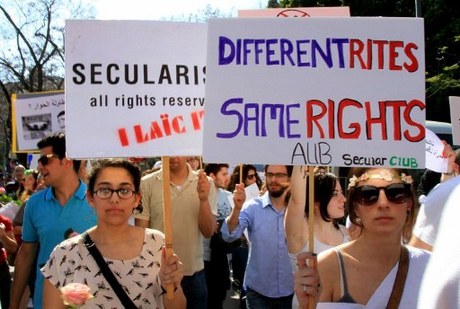Thousands of Lebanese demonstrators—most of them under the age of 30—marched through Beirut last week in an effort to separate religion from politics.
The push for secularism in a region mostly defined by religious identity and religious politics is seen as a mostly younger-generational idea; a campaign where groups were mobilized through social networking sites like Facebook.
As many as 5,000 people banded together to rally and march through Lebanon’s capital with an energetic and upbeat attitude—rare in a country where most rallies draw a few hundred people at most.
The demonstration ended at the parliament building, a symbolic effort to bring about change in a nation and region defined by its religion and its unique government.
Lebanon’s government seats and positions are appropriated based on religion and the minority status of a candidate. These are portioned off and then given to leaders of various religious groups.
In theory, it gives everyone a piece of the pie and an effort to have their voices heard. It also creates intense factionalism, one of the many reasons why demonstrators advocate for separation between religion and politics.
According to a persons’ sect, government appointments, job postings, university slots and other positions can either be granted or denied. “What’s your sect?” is a common inquiry in a country run on these sectarian divisions.
Demonstrators argued that a person’s religion or sect should not matter when it comes to acquiring a position, and it’s one of the reasons why Lebanon’s economy and position in the world has not improved as much as it could.
Reporters from the Los Angeles Times talked to marchers, most of whom were students or other young people who have become jaded with the government policies which discriminate one way or another.
“I don’t believe religion and politics should be mixed,” cried Amer Saidi, a political science student at Lebanese American University. “Religion should not be used as a political tool.”
Architect and Lebanese Druze, Yasser Andari, asserted the claim that people should be judged based on their qualifications and not their religion. “We want a government that looks at all people as people.”
This is the first known “secular pride” demonstration since the end of Lebanon’s civil war in 1990. Even organizers of the march were stunned at the thousands who turned out to support the cause.
Organizers said that the turnout was in response to frustration and dissatisfaction with the status quo among those marginalized by the system. Young people especially were vocal about setting up a system that was based on merit, rather than religion.
The push for secularism is seen as being modeled after the successful Turkish policies regarding the strict separation of religion and government.
Many intellectuals within Lebanon contend that the country cannot truly improve its economic or social position in the international community until religion has been removed from government.
Even so, in the Muslim-dominant Middle East, secularism is almost synonymous for godlessness or atheism.
Many fear that the country would become too westernized, but marchers contend that this would not be the case. Alluding to two major foreign power influences, shouts of “neither Syria, nor America, but a secular Lebanon!” were heard throughout the long march.

